Women Serving in the Armed Forces

More women have been killed in combat in Afghanistan and Iraq than in World War II, the Korean War and the Vietnam War combined.
Sgt. First Class Juanita Wilson knows the personal sacrifice of fighting a war all too well. Seven months into her tour, the mother of two became the first American mother to lose a limb in Iraq. "Right outside of Baghdad, my convoy was hit by an improvised explosive device," she says. "I looked down and realized that there was no left hand there."
Juanita didn't realize the limitations of her injury until a month later—her daughter Kenyah had simply asked for a sandwich. "For the first time I had to say to my kid that, 'No, Kenyah, I can't fix you a sandwich,'" she says. "I don't think I'll ever forget that day because it was the most painful day to me"
Sgt. First Class Juanita Wilson knows the personal sacrifice of fighting a war all too well. Seven months into her tour, the mother of two became the first American mother to lose a limb in Iraq. "Right outside of Baghdad, my convoy was hit by an improvised explosive device," she says. "I looked down and realized that there was no left hand there."
Juanita didn't realize the limitations of her injury until a month later—her daughter Kenyah had simply asked for a sandwich. "For the first time I had to say to my kid that, 'No, Kenyah, I can't fix you a sandwich,'" she says. "I don't think I'll ever forget that day because it was the most painful day to me"
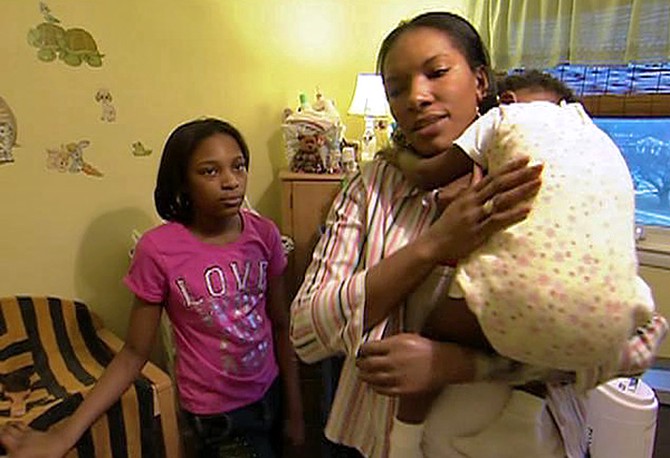
A wife and mother, Juanita says she focused more on her family's needs than her own after her injury. "I think the woman's nature is nurturing. So you come home and you make sure everybody else is happy, everybody else is content, and you don't have anyone to worry about what's really going on with you," she says.
Part of that, Juanita says, was putting on a brave face for everyone around her. "As soon as I came home, immediately it was, 'Don't worry about me.' Get to my role as a mother. I didn't want my kids to worry about me. [People would ask,] 'How are you today, Juanita?' [I'd say,] 'I'm wonderful.' And that's just how I go through the day."
But, in reality, Juanita says she is still haunted by her experience. "Four years later, [the explosion feels] just like yesterday. I have nightmares. I have flashbacks my truck's going to blow up," Juanita says.
"Almost everything seems like it's going to end in disaster. And anxiety, how I'm just going to lose it. My soul is going to be gone, it's going to be obliterated, it's going to blow up."
Part of that, Juanita says, was putting on a brave face for everyone around her. "As soon as I came home, immediately it was, 'Don't worry about me.' Get to my role as a mother. I didn't want my kids to worry about me. [People would ask,] 'How are you today, Juanita?' [I'd say,] 'I'm wonderful.' And that's just how I go through the day."
But, in reality, Juanita says she is still haunted by her experience. "Four years later, [the explosion feels] just like yesterday. I have nightmares. I have flashbacks my truck's going to blow up," Juanita says.
"Almost everything seems like it's going to end in disaster. And anxiety, how I'm just going to lose it. My soul is going to be gone, it's going to be obliterated, it's going to blow up."
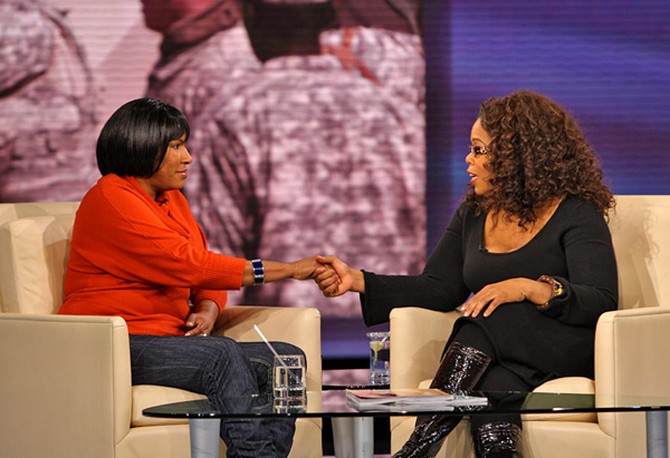
For the first time, Juanita admits her emotional struggles to her family. "My husband is really going to be in shock," she says.
No matter what, Juanita says she's trying to see the good in her situation and uses a passage in scripture to help cope. "It says that 'All things work together for the good of them that love the Lord,'" she says. And Juanita says she does feel fortunate—especially when she hears stories of what other soldiers have experienced. "I don't even feel worthy to complain, because I feel like I was one of the lucky ones."
So what's next for Juanita? Despite losing a limb, Juanita has reenlisted for two very important reasons—her daughters. "I want my two girls to know that there is no limit in life. I want them to see me as a strong mother who's stood for things that are right, who has worked hard, who's led a life that they can look back on and say: 'You know what? My mother wanted the best for me. My mother served her country,'" Juanita says. "Because my daughter, 10 years old, tells me, 'Mommy, I'm going to be an Army doctor,' because she feels like I received wonderful care. I love the military."
No matter what, Juanita says she's trying to see the good in her situation and uses a passage in scripture to help cope. "It says that 'All things work together for the good of them that love the Lord,'" she says. And Juanita says she does feel fortunate—especially when she hears stories of what other soldiers have experienced. "I don't even feel worthy to complain, because I feel like I was one of the lucky ones."
So what's next for Juanita? Despite losing a limb, Juanita has reenlisted for two very important reasons—her daughters. "I want my two girls to know that there is no limit in life. I want them to see me as a strong mother who's stood for things that are right, who has worked hard, who's led a life that they can look back on and say: 'You know what? My mother wanted the best for me. My mother served her country,'" Juanita says. "Because my daughter, 10 years old, tells me, 'Mommy, I'm going to be an Army doctor,' because she feels like I received wonderful care. I love the military."
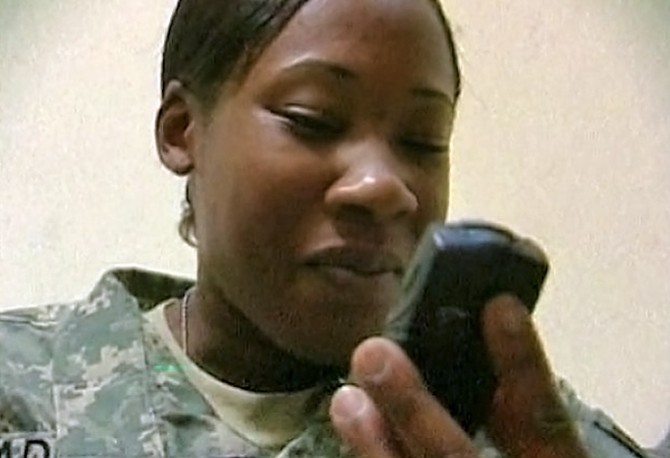
Stationed in Camp Falcon, a U.S. military base outside Baghdad, Sgt. Takila Addison's job is to coordinate all cargo and supplies coming in and out of the base. "If I make a mistake, it can be very critical," she says.
See what a typical day is like for Takila.
Takila is serving her second tour in Iraq—but it's her first time as a single mother. "I left my daughter. She's 2. I keep [pictures of her] on my person right here in my pocket at all times," Takila says. "So when I just need to look at something and cheer myself up, I just pull them out."
Her personal living quarters aren't large, but they're big enough to hold a bed, a dresser with two drawers and a wall locker. There are also thick walls around where the soldiers sleeping quarters to protect against things like mortar rounds and rockets. "I am thankful that we are actually inside of a building now," she says. "The first time I deployed to Iraq, we were living in tents and there was up to 20, 30 females. So this is a big improvement."
See what a typical day is like for Takila.
Takila is serving her second tour in Iraq—but it's her first time as a single mother. "I left my daughter. She's 2. I keep [pictures of her] on my person right here in my pocket at all times," Takila says. "So when I just need to look at something and cheer myself up, I just pull them out."
Her personal living quarters aren't large, but they're big enough to hold a bed, a dresser with two drawers and a wall locker. There are also thick walls around where the soldiers sleeping quarters to protect against things like mortar rounds and rockets. "I am thankful that we are actually inside of a building now," she says. "The first time I deployed to Iraq, we were living in tents and there was up to 20, 30 females. So this is a big improvement."
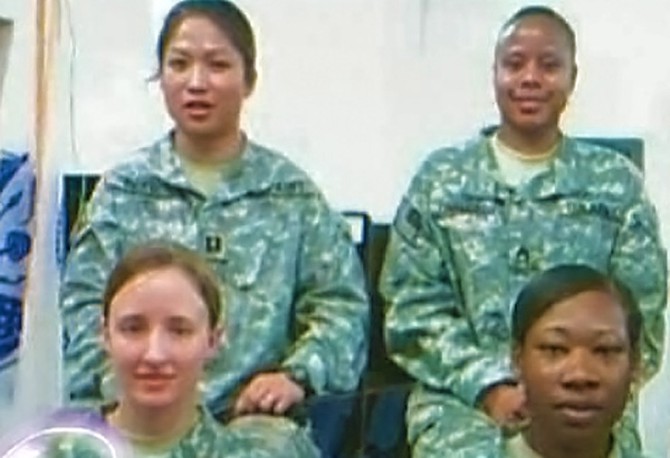
Serving with Takila are Captain Ty Reed, Staff Sgt. Yursala Charles and Captain Katy Simonis. The women Skype in from Iraq to share more of what life is like for women on the front lines.
When Ty first arrived in Iraq, she says she was concerned with her own safety. Now, on her third deployment, Ty says she sees big improvments. "People are out in the market buying food, kids are playing, kids are going to school," Ty says.
For the most part, Yursala says the challenges facing men and women in Iraq are the same, but she says she has to work a little harder because of her stature. "Being 4'11" and I don't weigh as much—I only weigh 94 pounds—so I mostly struggle with carrying all the gear."
After becoming so used to Army life, Takila says it takes some time to adjust to civilian life after a tour. "When we're home after leave, you have to find different ways besides a ponytail for your hair," she says. "We're constantly in combat boots most of the time, and once I'm home, I have to learn how to walk in heels again, and your makeup, jewelry—going from dog tags to actual real jewelry—so you have to get a little dressy."
We've all seen the news reports, but what to do these women really want us to know about life in Iraq? "I'd like America to know that regardless of the political situation back home or any policies that we're experiencing, the men and women in the Armed Forces around the world are serving the country every day trying to do our best and trying to represent the country in a dignified and the best way possible," Katy says. "I know a lot of times the news tends to show the negative stories, but there is great progress being made over here."
Takila agrees. "We are doing great things—providing fresh water, electricity, better homes and better security," she says. "So there's a lot of great things happening while we're over here."
When Ty first arrived in Iraq, she says she was concerned with her own safety. Now, on her third deployment, Ty says she sees big improvments. "People are out in the market buying food, kids are playing, kids are going to school," Ty says.
For the most part, Yursala says the challenges facing men and women in Iraq are the same, but she says she has to work a little harder because of her stature. "Being 4'11" and I don't weigh as much—I only weigh 94 pounds—so I mostly struggle with carrying all the gear."
After becoming so used to Army life, Takila says it takes some time to adjust to civilian life after a tour. "When we're home after leave, you have to find different ways besides a ponytail for your hair," she says. "We're constantly in combat boots most of the time, and once I'm home, I have to learn how to walk in heels again, and your makeup, jewelry—going from dog tags to actual real jewelry—so you have to get a little dressy."
We've all seen the news reports, but what to do these women really want us to know about life in Iraq? "I'd like America to know that regardless of the political situation back home or any policies that we're experiencing, the men and women in the Armed Forces around the world are serving the country every day trying to do our best and trying to represent the country in a dignified and the best way possible," Katy says. "I know a lot of times the news tends to show the negative stories, but there is great progress being made over here."
Takila agrees. "We are doing great things—providing fresh water, electricity, better homes and better security," she says. "So there's a lot of great things happening while we're over here."
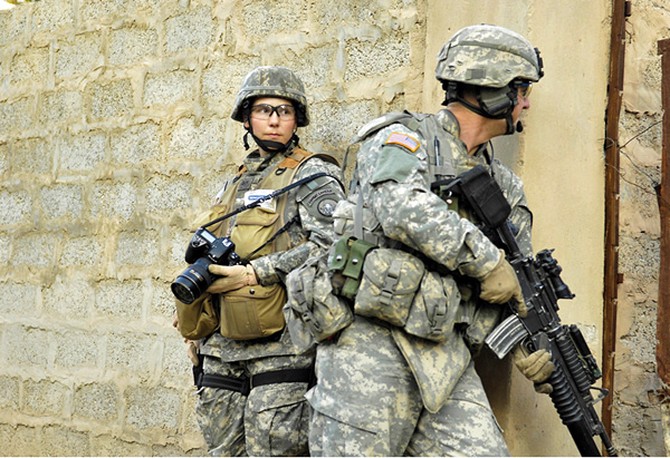
© U.S. Air Force photo
She may look like the girl next door, but Staff Sgt. Stacy Pearsall's camera has captured the horrors of war. After retiring from the Air Force in 2008, she is now pursuing a career as a civilian photographer and continues to go above and beyond the call of duty. She was awarded one of the military's highest honors—the Bronze Star—for pulling wounded soldiers to safety in the midst of an ambush.
Recalling her days on active duty, Stacy says she had to be prepared at all times. "You never know when situations are going to go bad," Stacy says. "And there have been several times where I had to put down the camera and put up the gun."
Recalling her days on active duty, Stacy says she had to be prepared at all times. "You never know when situations are going to go bad," Stacy says. "And there have been several times where I had to put down the camera and put up the gun."
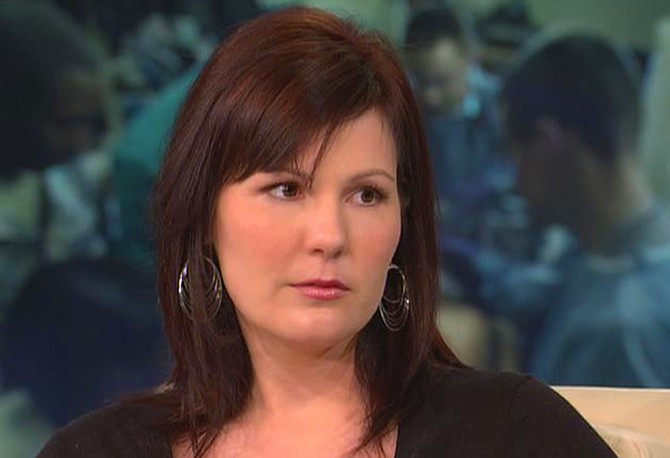
If there's one thing Stacy wants people to know about women in war, it's that there is no longer a clear front line. "Not in this war. Not in Iraq. Not in Afghanistan. And since those lines are blurred, women are out there doing the same jobs as men. And whether we like to admit it or not, women are on the front lines and we are doing the job," Stacy says. "And it would be great if we could just accept it and accept that women should be able to do whatever they want, whether it's be a housewife or being a combat photographer."
Although her job isn't to fight in combat, Stacy says she's been forever changed by what she's seen through her lens. "I'm still dealing with the issues of the possibility of having taken somebody's life or seeing other lives taken," she says. "It changes you, and you become somebody else when you're there. It's a defense mechanism."
Returning to regular life hasn't been easy, Stacy says. Even though her husband is also in the military, she finds it difficult to share her experiences with him. "It's still hard to articulate the things that you've been through, especially things that are so complicated," she says. "There's so many things he doesn't know that happened out there yet that I'm still working through to be able to share with him."
Stacy says no one who goes into battle comes back the same and urges the families of returning soldiers to be patient. "Like myself, I'm sure it's the same for other soldiers, just to have that support and that guidance and maybe a step in the right direction, whether it's counseling or just, 'Hey, whenever you want to talk, I'm here,'" she says.
Although her job isn't to fight in combat, Stacy says she's been forever changed by what she's seen through her lens. "I'm still dealing with the issues of the possibility of having taken somebody's life or seeing other lives taken," she says. "It changes you, and you become somebody else when you're there. It's a defense mechanism."
Returning to regular life hasn't been easy, Stacy says. Even though her husband is also in the military, she finds it difficult to share her experiences with him. "It's still hard to articulate the things that you've been through, especially things that are so complicated," she says. "There's so many things he doesn't know that happened out there yet that I'm still working through to be able to share with him."
Stacy says no one who goes into battle comes back the same and urges the families of returning soldiers to be patient. "Like myself, I'm sure it's the same for other soldiers, just to have that support and that guidance and maybe a step in the right direction, whether it's counseling or just, 'Hey, whenever you want to talk, I'm here,'" she says.

Above all, the intention behind Stacy's photos is to remain objective. "I know that not everybody ... can go there, so I try to take that opportunity to show what it's like on a day-to-day basis—the sleeping, the firefights and the impact it has on the citizens there as well."
See Stacy's photos from the front lines in Iraq.
See Stacy's photos from the front lines in Iraq.
Keep Reading
Published 02/26/2009




